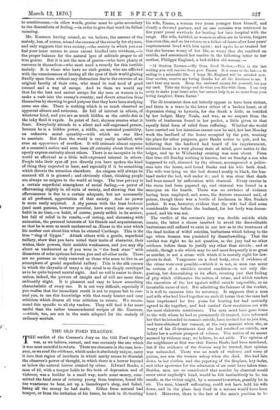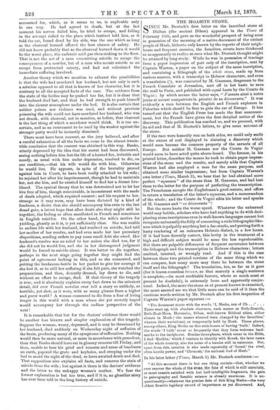THE OLD FORD TRAGEDY.
THE verdict of the Coroner's Jury on the Old Ford tragedy was, as we believe, correct, and was certainly the one which it was most merciful to return. There are elements in the case, how- ever, as we read the evidence, which make it absolutely unique, carry it into that region of incidents in which sanity seems to diminish the observer's power of thought, in which there is a horror beyond or below the natural horror created by crime. Edward Banks, a man of 42, with a temper liable to fits both of depression and of violence, was a builder in a small way, made some money, com- mitted the fatal error of retiring young from business, found life too wearisome to bear, set up a linendraper's shop, and failed, losing all the money he had made. Either from natural bad temper, or from the irritation of his losses, he took to ill-treating his wife, Emma, a woman two years younger than himself, and clearly a devoted partner, and on one occasion was sentenced to five years' penal servitude for beating her into hospital with the tongs. His wife, faithful, as women so often are to brutes, forgave him even this, and on his release on a ticket-of-leave after four years' imprisonment lived with him again ; and again he so treated her that she became weary of her life, so weary that she resolved on suicide, and announced her resolve in the following letter to her mother, Philippa-England, a bed-ridden old woman :— "12 Gretton Terrace.—My Dear, Good Mother,—This is the last writing you will receive from poor Emma. It is come to the last—a fit ending to a miserable life. I hope Mr. England will be satisfied now. Dear mother, receive my loving thanks for all the kindness to me. I can't bear any more. Keep the enclosed money for yourself, but pay my card. Take my things and do what you like with them. I am very sorry to make your heart ache, but cannot help it, so no more from your loving daughter, EMMA BANKS."
The ill-treatment does not latterly appear to have been violent, and there is a trace in the letter either of a broken heart, or of depression rising to hysteria, for she drank a little, as testified by her lodger, Mary Neale, and was, as we suspect from the bottle of laudanum found in her pocket, a little given to that equally fatal form of relief from suffering. Whether she would have carried out her intention cannot now be said, but last Monday week the landlord of the house occupied by the pair, wanting the place for other purposes, gave Banks notice to quit, and he, believing that the landlord had heard of his imprisonment, returned home in a very gloomy state of mind, gave notice to the lodger, and up to Wednesday evening was seen about. From that time till Sunday nothing is known, but on Sunday a son who happened to call, alarmed by the silence, accompanied a police- man into the house, and found Banks and his wife both dead. The wife was lying on the bed dressed neatly in black, the hus- band under the bed, well under it ; and it was clear that death had been caused by suffocation with charcoal. Every crevice in the room had been papered up, and charcoal was found in a saucepan on the hearth. There was no evidence of violence having been employed, and none, the doctors examined said, of poison, though there was a bottle of laudanum in Mrs. Banks's pocket. It was, however, evident that the wife had died some considerable time before the husband, for her body was decom- posed, and his was not.
The verdict of the coroner's jury was double suicide while insane, the latter a clause inserted to avoid the discreditable barbarisms still suffered to exist in our law as to the treatment of the dead bodies of wilful suicides, barbarisms which belong to the age when treason was punished by disembowelling. That the verdict was right we do not question, as the jury had no other evidence before them to justify any other than suicide ; and as suicide, though a sin which may be and most frequently is as great as murder, is not a crime with which it is morally right for law- givers to deal. Vengeance on a dead body, even if evidence of the crime were ever possible—which it is not, as man can never be certain of a suicide's mental condition—is not only dis- gusting, but demoralizing in its effect, creating just that feeling of pity which obliterates the notion of crime, and which renders the execution of the law against wilful suicide impossible, as an invariable cause of riot. But admitting the fairness of the verdict, it is well to examine into its accuracy. It supposes that a man and wife who had lived together on such ill terms that the man had been imprisoned for five years for beating her had mutually agreed to die together, and had carried their resolution out with the most elaborate contrivance. The man must have gone home to the wife whom he had so persistently ill-treated, have informed her that he intended to commit suicide, have invited her to join him, and have obtained her consent, at the very moment when she, so weary of his ill-treatment that she had resolved on suicide, saw before her a certain prospect of release. The notion of an assent secured by violence may, we believe, be set aside. The opinion of the neighbours at first was that Emma Banks had been murdered, but if the evidence of the doctors may be trusted, that opinion was unfounded. There was no mark of violence and none of poison, nor was the woman asleep when she died. She had lain clown in her clothes, and the papering of the fireplace, key-holes, and other apertures for the admission of air must have taken time. Besides, men are so constituted that murder by charcoal would never enter anybody's head, would be felt instinctively to be too unsafe, as the victim might, by a moment's exertion, possibly let in air. The man, himself suffocating, could not have held his wife down, and in the place they lived in a scream would have been heard. Moreover, there is the fact of the man's position to be
accounted for, which, as it seems to us, is explicable only in one way. He had agreed to death, but at the last moment his nerves failed him, he tried to escape, and falling in the attempt rolled to the place which instinct told him, as it told the cat, found dead by his side, was the one which as long as the charcoal burned offered the best chance of safety. He did not know probably that as the charcoal burned down it would be the worst place, the carbonic acid gas then sinking to the floor.
That is not the act of a man committing suicide to escape the consequences of a murder, but of a man who meant suicide as an escape from protracted misery, and had not calculated the immediate suffering involved.
Another theory which we mention to exhaust the possibilities is that the wife had murdered her husband, but not only is such
a solution opposed to all that is known of her character, but it is contrary to all the accepted facts of the case. The evidence from the state of the bodies may be pushed too far, but it is clear that the husband died last, and that he had strength to push himself into the clearer atmosphere under the bed. It is also certain that neither poison nor violence was used, and without previous poisoning the wife could not have murdered her husband, who was not drunk, with charcoal, not to mention, as before, that charcoal is the last thing of which a murderer would think. It is too un- certain, and as an instrument to be used by the weaker against the stronger party would be instantly dismissed.
There must have been consent, as the jury believed, and after a careful exhaustion of all the facts we come to the almost irresis- tible conclusion that the consent was obtained in this way. Banks, utterly depressed by the idea that his secret had been discovered, seeing nothing before him but the life of a hunted fox, irritable and moody, as usual with him under depression, resolved to die, on one condition,—that his wife would die with him. Otherwise he would live. He appears, in spite of the brutality proved against him in Court, to have been really attached to his wife ; he rejoined her after his imprisonment, though he had to maintain her, not she him, and he exerted himself to find her a decent live- lihood. The cynical theory that be was determined not to let her liVe free of him, though conceivable, is inconsistent with the mode of death adopted, which required consent ; and his request to her, strange as it may seem, may have been dictated by a kind of fondness, a desire that she should accompany him even to the last dread gate, a latent hope that after death also they might still be together, the feeling so often manifested in French and sometimes in English suicides. On the other hand, the wife's motive for yielding, ghastly as it is, is yet sufficiently clear. She was unable to endure life with her husband, had resolved on suicide, had told her mother of her resolve, and had even made her last pecuniary dispositions, sending orders to pay some small debt she owed. Her husband's resolve was no relief to her unless she died too, for if she did not he would live, and she in her distempered judgment would be forced to suicide alone. It was better to die together, perhaps in the next stage going together they might find the point of agreement lacking in this, and so she consented, and putting the laudanum-bottle in her pocket to give her courage if she lost it, or to still her suffering if she felt pain, she watched the preparations, and then, decently dressed, lay down to die, and without an effort to escape, died. If that theory of the tragedy is true, and it absolutely explains every fact down to the minutest detail, did ever French novelist ever tell a story so unlikely, so horrible, yet shot, as it were, with so many gleams from a higher and purer world ? A woman consented to die from a fear of living longer in this world with a man whom she yet secretly hoped would accompany her through the endless perspective of the next !
It is remarkable that but for the doctors' evidence there would be another less bizarre and simpler explanation of this tragedy. Suppose the woman, weary, depressed, and it may be threatened by her husband, died suddenly on Wednesday night of suffusion of the brain, producing many of the symptoms of suffocation. Nothing would then be more natural, or more in accordance with precedent, than that Banks should have sat in gloomy remorse till Friday, and then, unable to bear his grief and remorse and sense of loneliness on earth, papered the grate and keyholes, and creeping under the bed to avoid the sight of the dead, so have awaited death and died. That supposition also explains all facts, and removes the stain of suicide from the wife ; but against it there is the doctors' evidence and the letter to the unhappy woman's mother. We fear the former explanation is but too true, and if it is, no ghastlier story has ever been told in the long history of suicide.



































 Previous page
Previous page